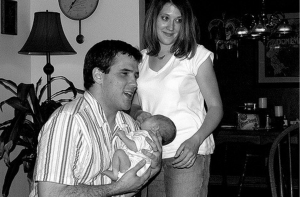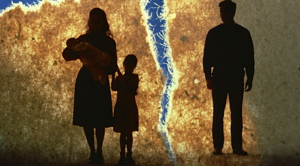Despite common assumptions, parents have less of an impact on their children’s future development than they’re often credited with. Twins reared apart usually aren’t much different than twins reared together, and adopted children don’t end up resembling their adoptive parents substantially more than strangers. While parents can indeed affect their children’s happiness profoundly, a healthy (and convincing) literature exists supporting the hypothesis that differences in parenting behaviors don’t do a whole lot of shaping in terms of children’s later personalities (at least when the child isn’t around the parent; Harris, 2009). This makes a good deal of theoretical sense, as children aren’t developing to be better children; they’re developing to become adults in their own right. What children learn works when it comes to interacting with their parents might not readily translate to the outside world. If you assume your boss will treat you the same way your parents would, you’re likely in for some unpleasant clashes with reality.
“Who’s a good branch manager? That’s right! You are!”
Not that this has stopped researchers from seeking to find ways that parent-child interactions might shape children’s future personalities, mind you. Indeed, I came upon a very new paper purporting to do just that this last week. It suggested that the quality of a father’s investment in his daughters causes shifts in his daughter’s willingness to engage in risky sexual behavior (DelPriore, Schlomer, & Ellis, 2017). The analysis in the paper is admittedly a bit tough to follow, as the authors examine three- and even four-way interactions (which are difficult to keep straight in one’s mind: the importance of variable A changes contingent on the interaction between B, C, & D), so I don’t want to delve too deeply into the specific details. Instead, I want to discuss the broader themes and design of the paper.
Previous research looking at parenting effects on children’s development often suffers from the problem of relatedness, as genetic similarities between parents and children make it hard to tease apart the unique effects of parenting behaviors (how the parents treat their children) from natural resemblances (nice parents have nice children). In a simple example, parents who love and nurture their children tend to have children who grow up kinder and nicer, while parents who neglect their children tend to have children who grow up to be mean. However, it seems likely that parents who care for their children are different in some important regards than those who neglect them, and those tendencies are perfectly capable of being passed on through shared genes. So are the nice kids nice because of how their parents treated them or because of inheritance? The adoption studies I mentioned previously tend to support the latter interpretation. When you control for genetic factors, parenting effects tend to drop out.
What’s good about the present research is its innovative design to try and circumvent this issue of genetic similarities between children and parents. To accomplish this goal, the authors examined (among other things) how divorce might affect the development of different daughters within the same family. The reasoning for doing so seems to go roughly as follows: daughters should base their sexual developmental trajectory, in part, on the extent of paternal investment they’re exposed to during their early years. When daughters are regularly exposed to fathers that invest in them and monitor their behavior, they should come to expect that subsequent male parental investment will be forthcoming in future relationships and avoid peers who engage in risky sexual behavior. The net result is that such daughters will engage in less risky sexual behavior themselves. By contrast, when daughters lack proper exposure to an investing father, or have one who does not monitor their peer behavior as tightly (due to divorce), they should come to view future male investment as unlikely, associate with those who engage in riskier sexual behavior, and engage in such behavior themselves.
Accordingly, if a family with two daughters experiences a divorce, the younger daughter’s development might be affected differently than the older daughter’s, as they have different levels of exposure to their father’s investment. The larger this age gap between the daughters, the larger this effect should be. After recruiting 42 sister pairs from intact families and 59 sister pairs from divorced families and asking them some retrospective questions about what their life was like growing up, this is basically the result the authors found. Younger daughters tended to receive less monitoring than older daughters in families of divorce and, accordingly, tended to associate with more sexually-risky peers and engage in such behaviors themselves. This effect was not present in biologically intact families. Do we finally have some convincing evidence of parenting behaviors shaping children’s personalities outside the home?
Look at this data and tell me the first thing that comes to your mind
I don’t think so. The first concern I would raise regarding this research is the monitoring measure utilized. Monitoring, in this instance, represented a composite score of how much information the daughters reported their parents had about their lives (rated from (1) didn’t know anything, (2) knew a little, or (3) knew a lot) in five domains: who their friends were, how they spent their money, where they spent their time after school, where they were at night, and how they spent their free time. While one might conceptualize that as monitoring (i.e., parents taking an active interest in their children’s lives and seeking to learn about/control what they do), it seems that one could just as easily think of that measure as how often children independently shared information with their parents. After all, the measure doesn’t specify, “how often did your parents try to learn about your life and keep track of your behavior?” It just asked about how much they knew.
To put that point concretely, my close friends might know quite a bit about what I do, where I go, and so on, but it’s not because they’re actively monitoring me; it’s because I tell them about my day voluntarily. So, rather than talking about how a father’s monitoring of his daughter might have a causal effect on her sexual behavior, we could just as easily talk about how daughters who engage in risky behavior prefer not to tell their parents about what they’re doing, especially if their personal relationship is already strained by divorce.
The second concern I have concerns divorce itself. Divorce can indeed affect the personal relationships of children with their parents. However, that’s not the only thing that happens after a divorce. There are other effects that extend beyond emotional closeness. An important example of these other factors are the financial ones. If a father has been working while the mother took care of the children – or if both parents were working – divorce can result in massive financial hits for the children (as most end up living with their mother or in a joint custody arrangement). The results of entering additional economic problems into an already emotionally-upsetting divorce can entail not only additional resentment between children and parents (and, accordingly, less sharing of information between them; the reduced monitoring), but also major alterations to the living conditions of the children. These lifestyle shifts could include moving to a new home, upsetting existing peer relations, entering new social groups, and presenting children with new logistical problems to solve.
Any observed changes in a daughter’s sexual behavior in the years following a divorce, then, can be thought of as a composite of all the changes that take place post-divorce. While the quality and amount of the father-daughter relationship might indeed change during that time, there are additional and important factors that aren’t controlled for in the present paper.
Too bad the house didn’t split down the middle as nicely
The final concern I wanted to discuss was more of a theoretical one, and it’s slightly larger than the methodological points above. According to the theory proposed at the beginning of the paper:
“…the quality of fathering that daughters receive provides information about the availability and reliability of male investment in the local ecology, which girls use to calibrate their mating behavior and expectations for long-term investment from future mates.”
This strikes me as a questionable foundation for a few reasons. First, it would require that the relationship of a daughter’s parents are substantially predictive of the relationships she is likely to encounter in the world with regard to male investment. In other words, if your father didn’t invest in your mother (or you) that heavily (or at least during your childhood), that needs to mean that many other potential fathers are likely to do the same to you (if you’re a girl). This would further require, then, that male investment be appreciably uniform across time in the world. If male investment wasn’t stable between males and across time within a given male, then trying to predict the general availability of future male investment from your father’s seems like a losing formula for accuracy.
It seems unlikely the world is that stable. For similar reasons, I suggested that children probably can’t accurately gauge future food availability from their access to food at a young age. Making matters even worse in this regard is that, unlike food shortages, the presence or absence of male parental investment doesn’t seem like the kind of thing that will be relatively universal. Some men in a local environment might be perfectly willing to invest heavily in women while others are not. But that’s only considering the broad level: men who are willing to invest in general might be unwilling to invest in a particular woman, or might be willing or unwilling to invest in that woman at different stages in her life, contingent on her mate value shifting with age. Any kind of general predictive power that could be derived about men in a local ecology seems weak indeed, especially if you are basing that decision off a single relationship: the one between your parents. In short, if you want to know what men in your environment are generally like, one relationship should be as informative as another. There doesn’t seem to be a good reason to assume your parents will be particularly informative.
Matters get even worse for the predictive power of father-daughter relationships when one realizes the contradiction between that theory and the predictions of the authors. The point can be made crystal clear simply by considering the families examined in this very study. The sample of interest was comprised of daughters from the same family who had different levels exposure to paternal investment. That ought to mean, if I’m following the predictions properly, that the daughters – the older and younger one – should develop different expectations about future paternal investment in their local ecology. Strangely, however, these expectations would have been derived from the same father’s behavior. This would be a problem because both daughters cannot be right about the general willingness of males to invest if they hold different expectations. If the older daughter with more years of exposure to her father comes to believe male investment will be available and the younger daughter with fewer years of exposure comes to believe it will be unavailable, these are opposing expectations of the world.
However, if those different expectations are derived from the same father, that alone should cast doubt on the ability of a single parental relationship to predict broad trends about the world. It doesn’t even seem to be right within families, let alone between them (and it’s probably worth mentioning at this point that, if children are going to be right about the quality of male investment in their local ecology more generally, all the children in the same area should develop similar expectations, regardless of their parent’s behavior. It would be strange for literal neighbors to develop different expectations of general male behavior in their local environment just because the parents of one home got divorced while the other stayed together. Then again, it should strange for daughters of the same home to develop different expectations, too).
Unless different ecologies have rather sharp boarders
On both a methodological and theoretical level, then, there are some major concerns with this paper that render its interpretation suspect. Indeed, at the heart of the paper is a large contradiction: if you’re going to predict that two girls from the same family develop substantially different expectations about the wider world from the same father, then it seems impossible that the data from that father is very predictive of the world. In any case, the world doesn’t seem as stable as it would need to be for that single data point to be terribly useful. There ought not be anything special about the relationship of your parents (relative to other parents) if you’re looking to learn something about the world in general.
While I fully expect that children’s lives following their parents divorce will be different – and those differences can affect development, depending on when they occur – I’m not so sure that the personal relationship between fathers and daughters is the causal variable of primary interest.
References: DelPriore, D., Schlomer, G., & Ellis, B. (2017). Impact of Fathers on Parental Monitoring of Daughters and Their Affiliation With Sexually Promiscuous Peers: A Genetically and Environmentally Controlled Sibling Study. Developmental Psychology. Advance online publication. http://dx.doi.org/10.1037/dev0000327
Harris, J. (2009) The Nurture Assumption: Why Children Turn Out the Way They Do. Free Press, NY.




